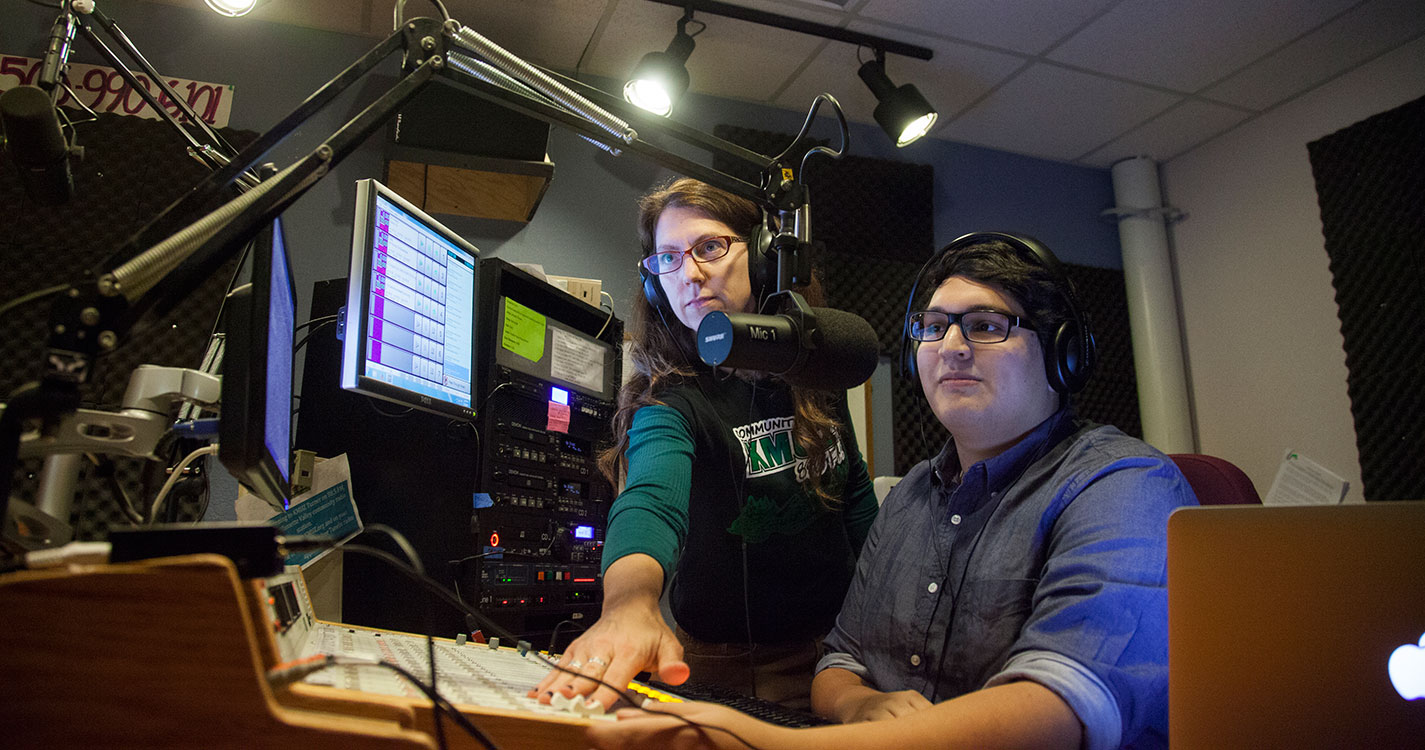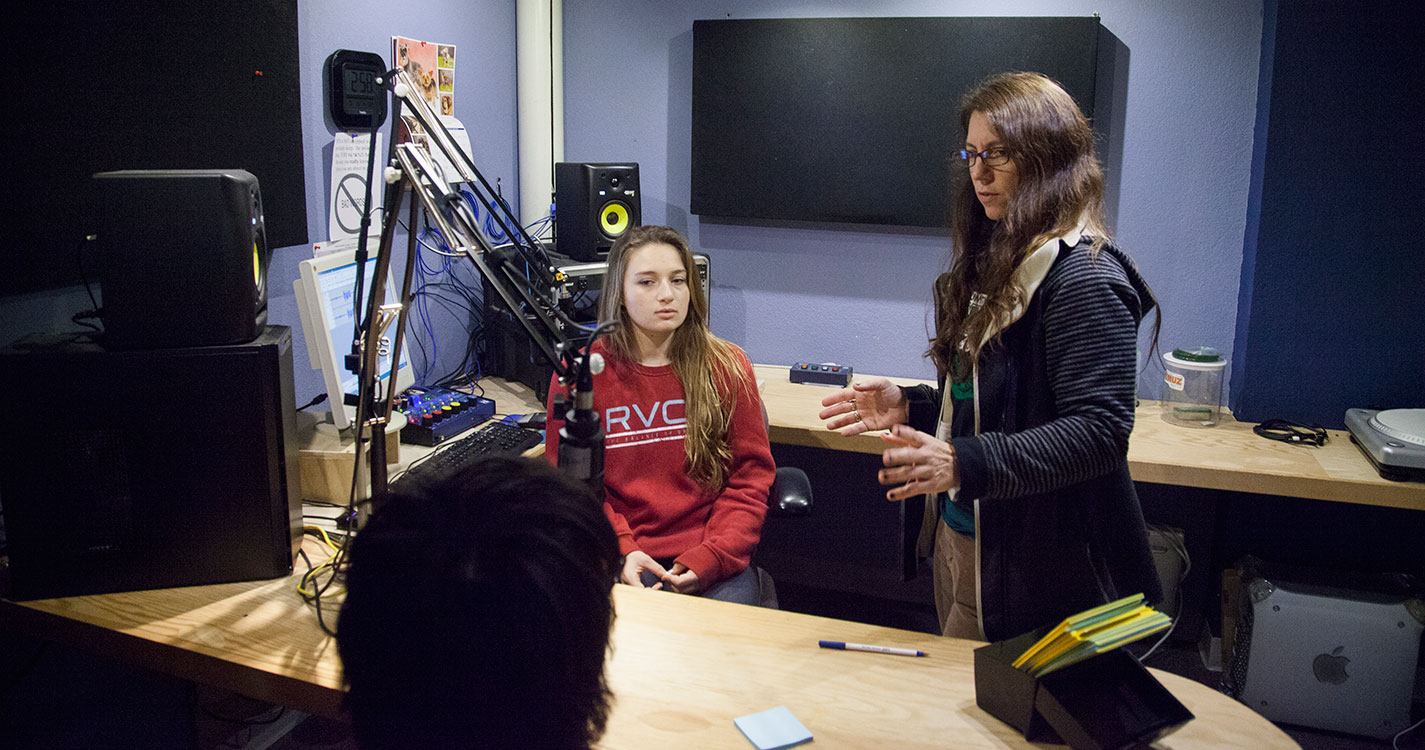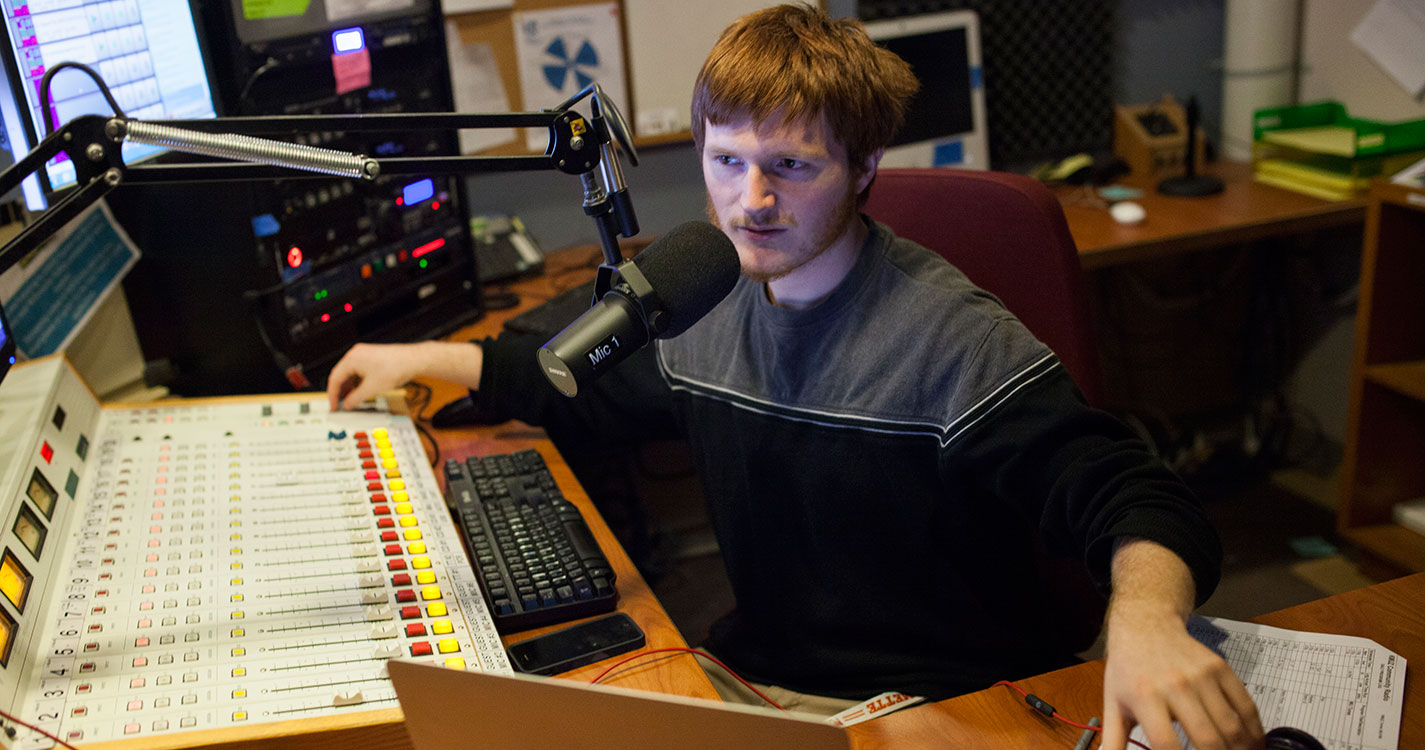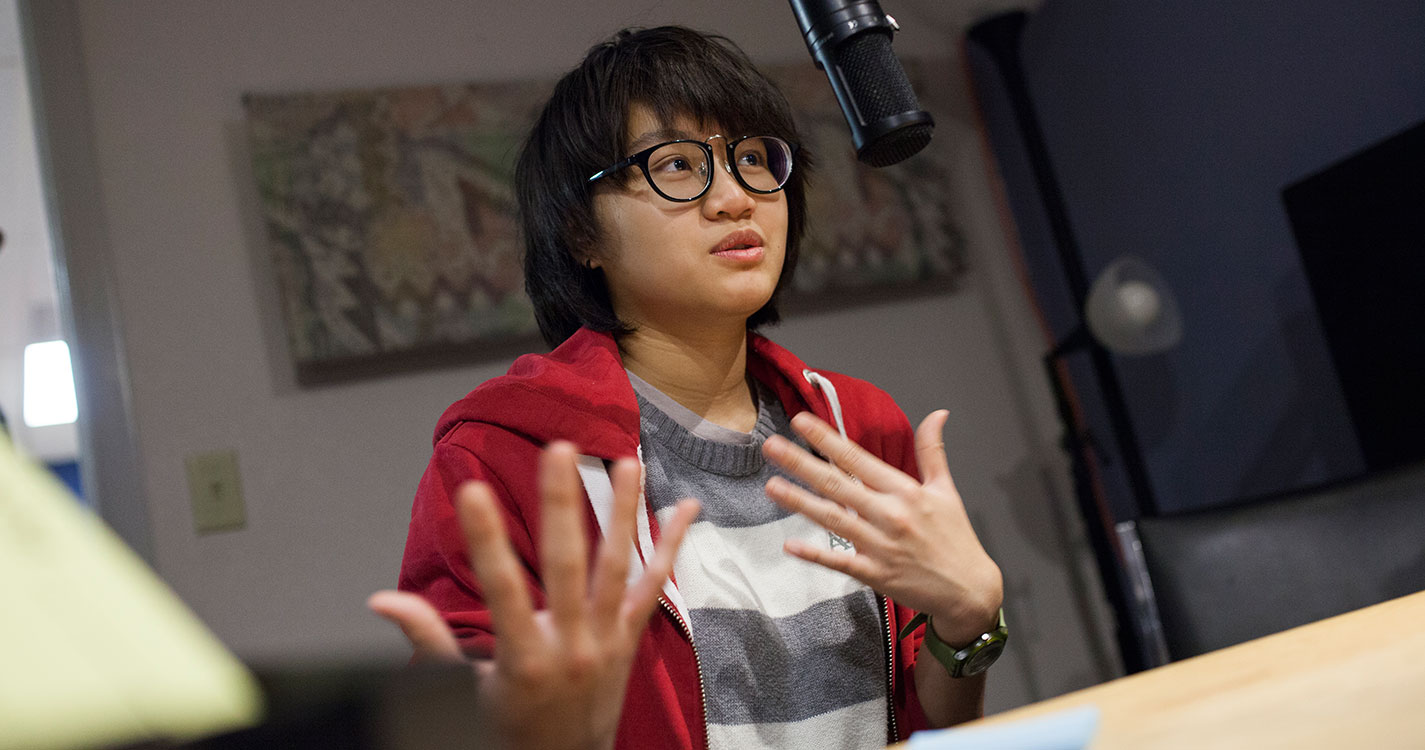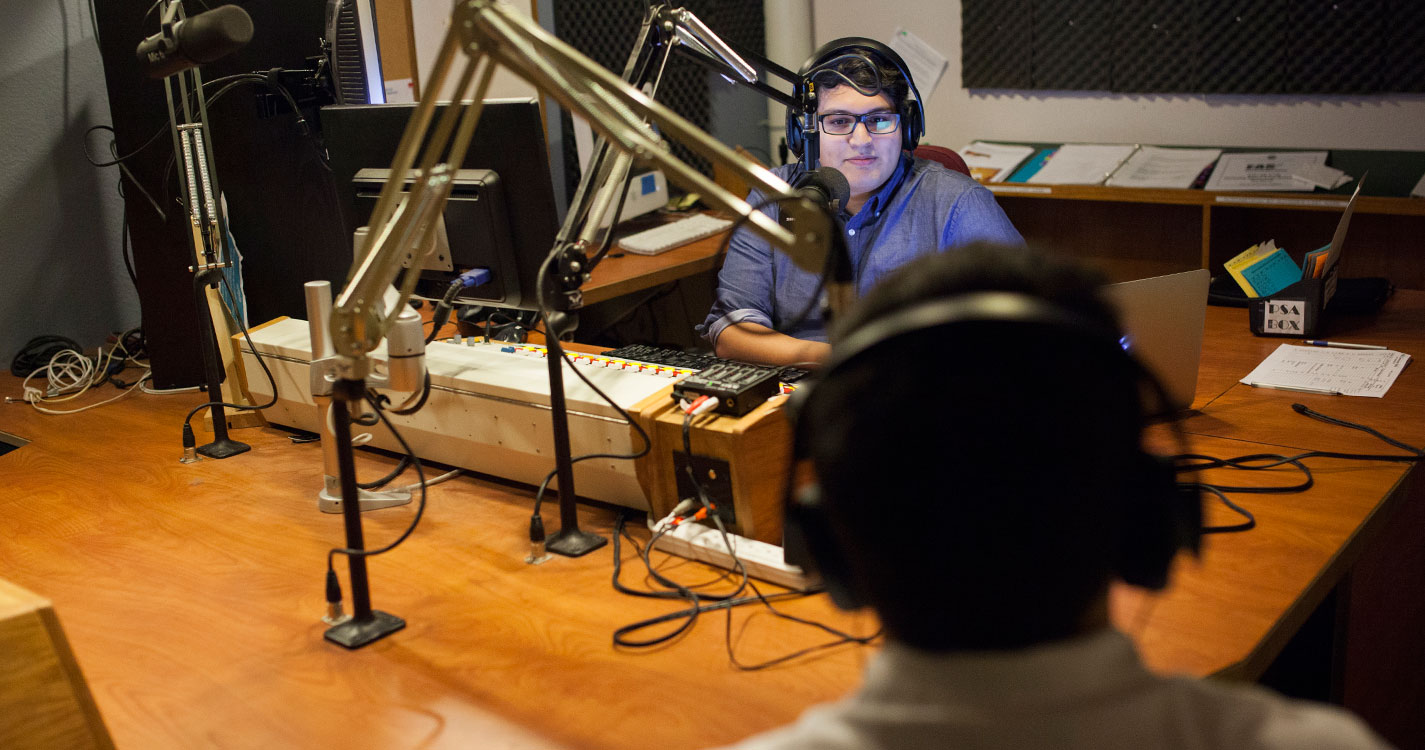In a dark room with carpet- and foam-covered walls, Jarrett Skaff ’18 and Kevin Liebson ’15 sit across a table from each other, headphones covering their ears. Metal arms spider out from the center of the table to float microphones in front of their faces, and computer monitors illuminate Skaff as he leans forward and speaks: “Thank you very much. You are tuning in to 88.5 KMUZ and 'WU-Who.'”
For the next half hour, needles bounce in front of orange screens on a sound board as Skaff interviews Liebson about his activities at Willamette, specifically his role as president of the Phi Delta Theta fraternity. It’s not only Willamette students who are listening — KMUZ is the Willamette Valley’s community radio station, and the interview is broadcasting live across the region and online.
Skaff is understandably nervous, tripping over a few of his questions, but he leads Liebson through an informative discussion about the role of Greek Life at Willamette and how it can teach students about leadership and philanthropy.
Skaff knew nothing about radio before signing up for Karen McFarlane Holman’s “Community Radio” College Colloquium course this past fall. Just two months into the class, he and his 13 classmates are conducting interviews on the air.
“I think this is one of the best Colloquium classes,” he declares after the show ends. “You’re interacting with the Willamette community and Salem, and you’re learning so many skills.”
A Venue for Expression
A few days earlier, over a cup of coffee at the Willamette Bistro, Holman ruminated on the major themes of her course. “It’s all about community, and voices,” the chemistry professor says. “I talk about how community radio can be a venue for people to express themselves.”
That’s why Holman has her students read “Radio Cultures,” a book that explores the ways groups outside the mainstream have used radio to counter discrimination and bias. “It allows my students to see how radio can be a venue for those who don’t always get the chance to be heard, and how it can give people a place to discuss ideas and learn from each other,” Holman says.
With shows dedicated to everything from transgender issues to Russian rock to parenting children with special needs, KMUZ certainly demonstrates that idea of diversity and open dialog.
“Community radio gives underrepresented groups a chance to say what they want and to share what they’re doing,” says Kel Mandigo-Stoba ’17, one of Holman’s former students. “KMUZ allows smaller communities to come together to give you a better picture of what’s happening throughout the larger community of Salem.”
Holman found her own voice partly through radio — she worked as a DJ and program director for several campus stations during college, and was a leading founder of KMUZ, which first went on the air three years ago.
Holman and Willamette history professor Bill Smaldone both serve on KMUZ’s board of directors, and several other university professors and staff members have appeared on various shows. But Holman is working to connect more students with the station.
Several of her first Colloquium students went on to get their own KMUZ shows, including Mandigo-Stoba. On Sunday afternoons, he co-hosts the eclectic “WU Tunes” show with Shea McFadden ’17. Linka Wade ’18, one of Holman’s latest students, occasionally joins them on air.
“There’s something really magical about being on the radio and knowing that someone out there is listening just for you,” Wade says. “I might be talking about a topic that really matters to someone, and the thought that I can connect with them in this way is really cool.”
“The first time I was on the radio, I remember my hands were shaking hard because I was so nervous,” McFadden adds. “Now I walk into the station on Sundays and I just throw my stuff down, pull out my computer and I’m good to go. I feel more confident in my voice. I know now that I have important things to say, and by being on the radio, I have this opportunity to share things that are meaningful to me.”
The Larger Community
This year’s Colloquium students went on the air several times. Skaff’s interview with Liebson was part of a series where the first-year students interviewed upperclassmen about their campus involvement.
Later, Holman broadened their idea of community by asking them to interview leaders from Salem nonprofits. The students chose a wide array of organizations to highlight, from Turtle Ridge Wildlife Center to Oregon College Mentors to the Marion-Polk Food Share.
“It’s great for KMUZ to be able to tap into Willamette as a resource, and it’s great for Willamette people to be able to engage more with the Salem community,” Holman says. “I really see that bridge between the two sides getting stronger and stronger as time goes on.
“How many people, when all is said and done, can say they were at the helm of a radio show? There are so few. Not only did my students do that, but they also created something that is interesting, engaging and of value to the community.”
*****
Listen to "WU-Who"
What: An interview show produced by Karen Holman’s College Colloquium students, broadcasting on KMUZ community radio.
Listen to archives: Find clips of all the interviews on KMUZ's website: Willamette upperclassmen; Salem-area nonprofits.

